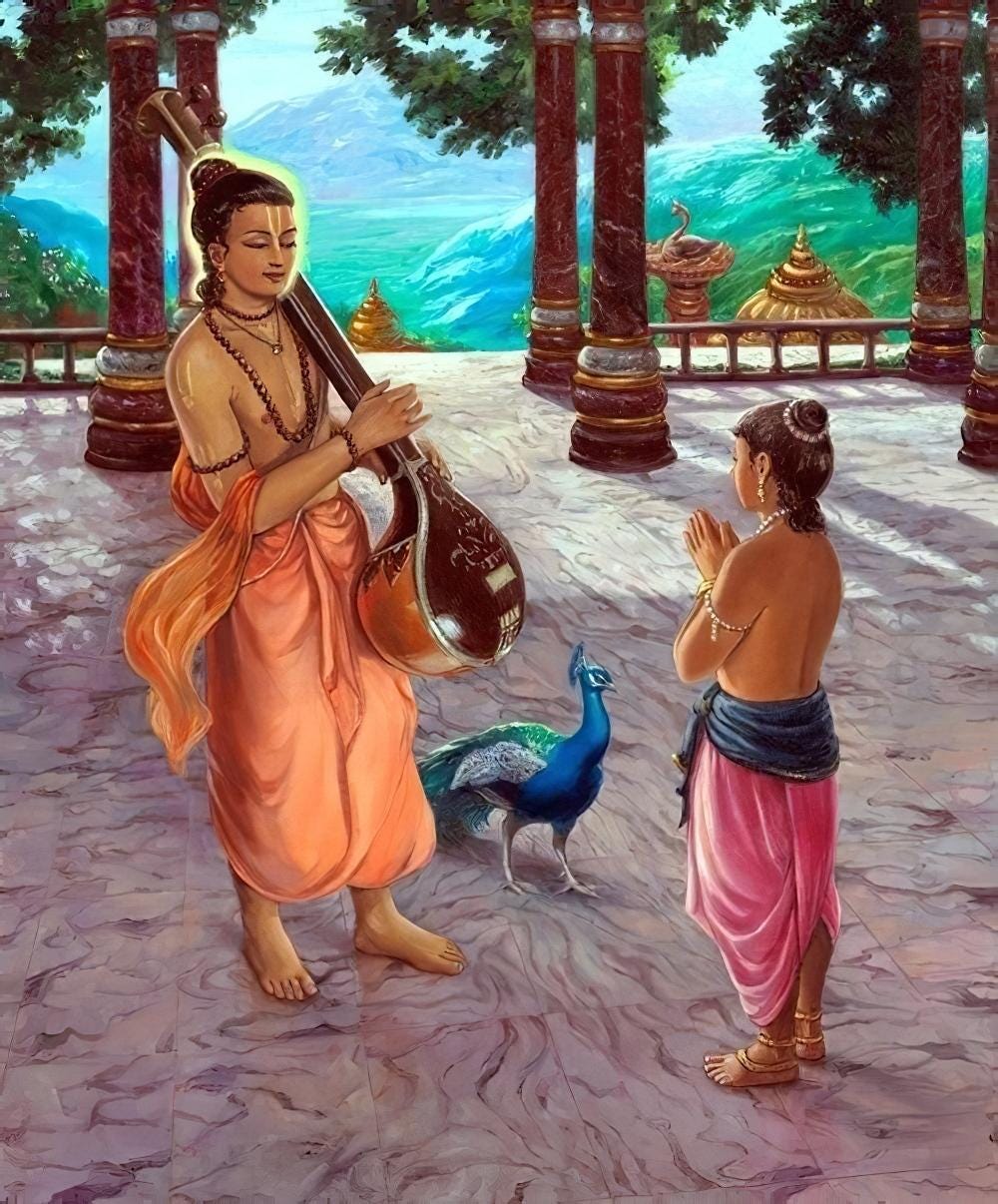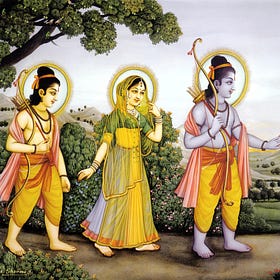How the mother of Dhruva Mahārāja helped him to find the Lord
Once, when Dhruva was trying to get up into the lap of his father, his stepmother spoke very enviously towards him. His mother, however, was able to turn it into the push that directed him to the Lord
The pastime of Dhruva Mahārāja is well-known and is a great source of inspiration for all devotees. Mahārāja Uttānapāda had two queens, Sunīti (the older queen, mother of Dhruva) and Suruci (the mother of Uttama, the younger son). The rule when a man has more than one wife is that he must treat all equally, since any special preference will lead to envy and dissatisfaction, which can create havoc. Unfortunately, although highly qualified, Uttānapāda developed a special preference for Sunīti, who used this to her advantage, planning to deprive Dhruva of his right to the throne in favor of her son. Once, when Dhruva was trying to get up into the lap of his father, she spoke very enviously towards him, although he was at the time a small child, only five years old.
The boy Uttama was sitting on the lap of the king, and as a small child, it was natural for Dhruva to also be on the lap of his father, together with his brother. This is a basic right for any child. Suruci, however, was angered by this because she was anxious to diminish the position of Dhruva and thus reinforce the position of her own son, and thus prohibited and censored Dhruva. She spoke right in front of the king, but he was so much under her control that he didn’t protest. When Dhruva heard these words, he first looked at his father, seeking his protection, but seeing that he was indifferent to him, he became deeply frustrated.
Although just a small child, Dhruva already had the qualities of a Kṣatriya, such as pride and determination. It is described that he was in great anger and started breathing very heavily, just as a snake struck by a stick. Seeing that his father would not defend him, he immediately left the palace and went to his mother, Sunīti.
It’s interesting to note that Dhruva left the palace, which indicates Sunīti was so neglected that she was not even living in the palace with the king. Suruci was doing everything she could to push her further away so the king would forget her and Dhruva. It’s also worth noting that all of this happened in Satya-yuga. Although there are also kings in Satya-yuga, responsible for protecting society, everyone is supposed to be pure and firmly devoted to the Lord. The standard at the time was so high that by just desiring to commit a sinful act, a person would become liable to the sinful reaction. The behavior of Suruci was scandalous for that time, and she eventually had to die because of such offenses, even though she later regretted her actions.
What about Sunīti? What did she do?
Hearing the description of Dhruva, Sunīti was deeply pained, but she realized there was nothing she could do to remediate it. She was, however, spiritually enlightened and could thus help Dhruva with good instructions, acting thus as his vartma-pradarśaka-guru, the guru who shows the way. Because of this contribution, Suniti would eventually go back home, back to Godhead, together with her exalted son.
The first instruction of Sunīti was not to desire anything bad for his stepmother, since by causing pain to others, we become ourselves afflicted with the same pain later due to the law of karma. We can see that thanks to this instruction, Dhruva didn’t perform his austerities out of a desire for revenge but simply to obtain a kingdom better than that of his fathers and ancestors, since his birthright to become the king of Bhu-Mandala after his father was denied.
The second instruction of Sunīti was that, although cruel, the words of Suruci were actually correct. Without being favored by the Supreme Lord, no one can achieve any success in life. The solution for Dhruva’s situation was to worship the Supreme Lord. No one else could help him. The Lord is the source of power for everyone, and by worshiping Him, both Brahma, the great-grandfather of Dhruva, and Svāyambhuva Manu obtained their posts and power. Following their footsteps, she said, Dhruva should also worship the Lord to obtain what he desired. She also hinted that ultimately one should not approach the Lord for asking for material benefits, but simply take shelter of Him in devotional service and obtain liberation from the cycle of birth and death, something that Dhruva would realize later on.
Sunīti was a great devotee of the Lord, and we can see that she gave Dhruva the right instructions to direct the anger he was feeling in a positive direction, seeking an audience with the Lord instead of directly taking action against his stepmother. In this way, Sunīti put Dhruva on the right path, leading him to later meet with Nārada Muni, who acted as both his dīkṣā and śikṣā guru.
After receiving these instructions, Dhruva considered them carefully and left for the forest in search of the Supreme Personality of Godhead. This is also significant because we should not accept instructions blindly. If there are doubts, one should clarify them by asking relevant questions. When we fully understand spiritual instructions, we can find the determination to carry them out to the end.
Nārada Muni became aware of Dhruva’s determination and decided to meet him on the way. Nārada was not present in the palace when the events happened; in fact, he was probably in another part of the universe. There is no way a message could travel so fast to the point that Nārada could have been informed by ordinary means. How, then, could he know? In his purport, Prabhupāda reveals details that explain the position of not just Nārada Muni but of all bona fide spiritual masters:
“Thus the question may be raised how Nārada overheard all these topics. The answer is that Nārada is trikāla-jña; he is so powerful that he can understand the past, future and present of everyone’s heart, just like the Supersoul, the Supreme Personality of Godhead. Therefore, after understanding the strong determination of Dhruva Mahārāja, Nārada came to help him. It may be explained in this way: The Supreme Personality of Godhead is present in everyone’s heart, and as soon as He understands that a living entity is serious about entering devotional service, He sends His representative.”
Pure devotees can know the past, present, and future due to their connection with the Lord. This doesn’t mean they are on the same level as the Supreme Lord, but that due to their contact with the Supersoul, they know everything they need to know to perform their service and help their disciples to progress in spiritual realization. In other words, the spiritual master doesn’t know literally everything as the Supersoul does, but by the grace of the Lord, he knows everything he needs to know to help his disciples, just like in the case of Nārada Muni. This deep connection becomes possible because such pure devotees completely dovetail their desires with the desires of the Lord, ceasing to have separate interests. They thus put themselves in the hands of the Lord, who can use them as tools to fulfill His transcendental plans.
You can also donate using Buy Me a Coffee, PayPal, Wise, Revolut, or bank transfers. There is a separate page with all the links. This helps me enormously to have time to write instead of doing other things to make a living. Thanks!
Read also:
How to find a serious and reliable devotee wife or husband?
The whole purpose of family life in Krsna consciousness is to advance spiritually. When a materialistic person enters into family life, he is called “grhamedhi”, because his idea is to just increase his sense enjoyment. On the other hand, a devotee is called “grihastha” because his goal is to advance spiritually. His family life is an ashrama, a base from which to advance to higher spheres of devotional service.



